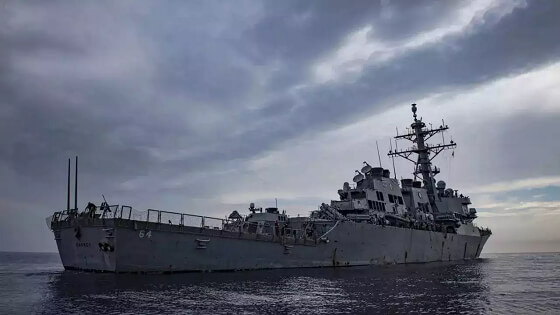Overview
The Red Sea is currently witnessing escalating tensions as multiple attacks have taken place. An Indian flagged crude oil tanker, MV Saaba, was targeted by Houthi militants, while a US destroyer successfully defended against four Houthi-launched drones. These incidents have significant implications, particularly for India, as they highlight the spreading of the Red Sea crisis into the wider Indian Ocean region.
Attack on Indian Crude Oil Tanker
According to the US military, the Indian flagged tanker MV Saaba sent a distress call to a US warship in the area after being attacked by Houthi militants. Fortunately, no injuries were reported, and the tanker was not hit directly, with the drone strike being classified as a near miss. This incident highlights the vulnerability of ships passing through the Red Sea and the potential impact on global trade routes.
US Destroyer’s Defense
In a separate incident, four drones launched from Houthi-controlled areas of Yemen were shot down by a US Destroyer in the southern Red Sea. The successful defense demonstrates the preparedness and capabilities of the US Naval forces in the region. However, these attacks further emphasize the disruptive actions of the Iran-aligned Houthi rebels and their impact on world trade routes.
Houthi’s Disruption of World Trade
The Houthi rebels, who hold significant control over Yemen, have been disrupting world trade for weeks. They have attacked ships passing through a strategic straight at the southern end of the Red Sea. The rebels claim these attacks are a response to Israel’s war against Gaza. However, their actions have resulted in increased prices of food and crude oil, contributing to global inflation.
Implications for India
India is particularly affected by these recent developments. Two attacks on Saturday, one near the coast of India against MV C Pluto and the other in the southern Red Sea against MV Saaba, had Indian crews onboard. The Indian Navy has not yet provided an official statement regarding the attack off the coast of India, while the US government attributes the attack in the Red Sea to the Houthi militants.
The escalation of the Red Sea crisis into the wider Indian Ocean region raises concerns for India’s interests. The rerouting of major shipping companies’ vessels due to the Houthi attacks has contributed to increased prices of food and crude oil, resulting in global inflation. New Delhi will undoubtedly prioritize safeguarding its interests in the face of these escalating tensions.
Conclusion
The recent attacks on an Indian crude oil tanker and the attempted drone attack on a US Destroyer in the Red Sea highlight the escalating tensions in the region. The actions of the Houthi militants, aligned with Iran, have disrupted world trade and impacted global inflation. India, with its significant maritime interests, is closely monitoring the situation as the crisis spreads into the wider Indian Ocean region. The response from the Indian Navy and the international community will be crucial in ensuring the safety of shipping routes and maintaining stability in the area.

